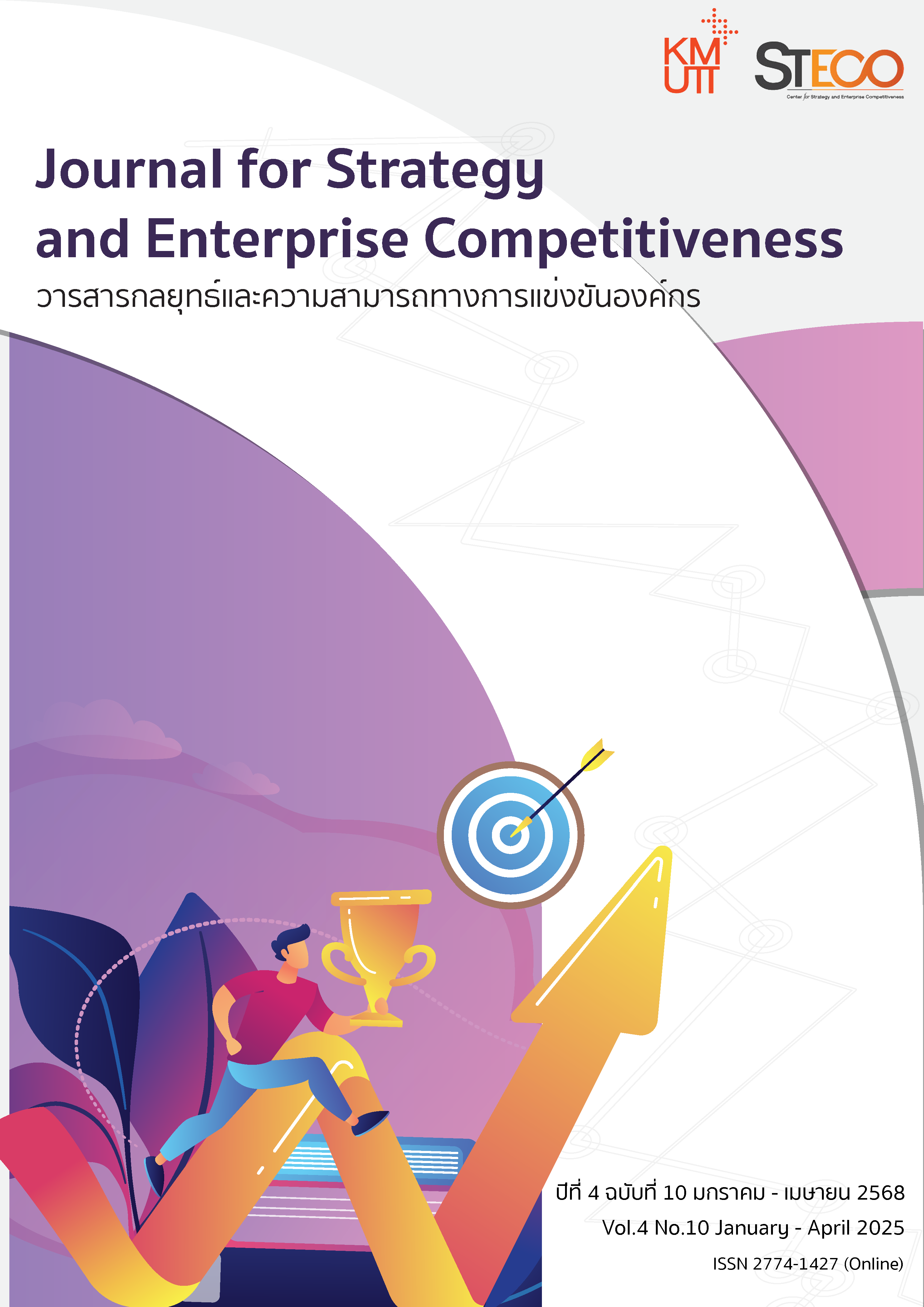A Study of Factors Influencing the Development of Digital Financial Literacy Among Small Entrepreneurs: A Case Study of Online Loan
Keywords:
digital finance, digital financial skills, small entrepreneurs, motivation, behavior changeAbstract
This study focuses on developing digital financial capabilities among small entrepreneurs in developing countries, influenced by the growth of digital financial services during the COVID-19 pandemic, which led to an increase in financial transactions via online loan applications. The research utilizes the framework of Behavior Change Theory and the I-change Model to examine factors influencing the development of digital financial skills, specifically emphasizing digital financial knowledge, attitudes, and self-efficacy. This study focuses on developing digital financial capabilities among 400 small entrepreneurs from Bangkok Metropolitan Area, influenced by the growth of digital financial services during the COVID-19 pandemic. Utilizing Behavior Change Theory and the I-change Model, the research examines factors affecting digital financial skills, emphasizing knowledge, attitudes, and self-efficacy. Structural Equation Modeling (SEM) and Path Analysis reveal a significant positive relationship between knowledge, motivation, and digital financial skills, revealing a significant positive relationship between knowledge and motivation, which directly impacts the digital financial skills and capabilities of entrepreneurs. Furthermore, entrepreneurs’ attitudes and self-confidence play a crucial role in fostering new behaviors that support confident use of online loan services and including the process of preparation and appropriate training. Recommendations from this study highlight the importance of developing motivational courses and government support to sustainably enhance small entrepreneurs' access to digital financial services.
References
Aastha, S. (2024). Digital technology improving financial inclusion in India: Post Covid evidence. Asian Journal of Economics, Business and Accounting.
Albornoz-Arias, N., & Santafé-Rojas, A. K. (2022). Self-confidence of Venezuelan migrant entrepreneurs in Colombia. Advances in the Social Sciences.
Anderson, S. G., Zhan, M., & Scott, J. (2004). Targeting Financial Management Training at Low-Income Audiences. Journal of Consumer Affairs, 38(2), 167-177. https://doi.org/10.1111/j.1745-6606.2004.tb00470.x
Baliawan, P. R., Latifah, P., & Herdiany, D. H. (2024). Analysis of the influence of self-efficacy, perceived ease to use, perceived benefits, and perceived risk on intention to use digital payment applications in Yogyakarta. Business Management and Analysis Journal, 7(1), 64-82.
Bandura, A. (1986). Social foundations of thought and action: A social cognitive theory. Prentice-Hall.
Bank of Thailand. (2023). Annual report on digital financial services usage among micro- entrepreneurs. Retrieved from https://www.bot.or.th
Bloom, B. S. (1956). Taxonomy of educational objectives, handbook I: The cognitive domain. David McKay Company.
Caleb, O. (2023). The role of attitude in the unified theory of acceptance and use of technology: A meta-analytic structural equation modelling study. International Journal of Technology in Education and Science.
Chang, Liu. (2022). 4. Applying Diffusion Model to Analyzing Stimulating Activities for Positive Attitude Platform. https://doi.org/10.1109/IMCEC55388.2022.10019993
Chen, Y., & Zhang, S. (2021). Digital financial literacy in developing economies: Barriers and opportunities for small enterprises. Journal of Financial Development, 14(2), 123-135.
Jose, J., & Ghosh, N. (2024). Digital financial literacy and its impact on financial behaviors. Advances in Finance, Accounting, and Economics Book Series.
Jiang, L., & Li, M. (2023). The impact of digital financial knowledge on confidence and security in online loan transactions: A study on small businesses. International Journal of Digital Finance, 7(1), 78-92.
Mongkolsuthree, M., et al. (2022). Financial literacy in the digital age: A case study of SMEs and online loans in Thailand. Asia-Pacific Journal of Business Innovation, 9(3), 256-269.
Or, C. (2023). The role of attitude in the unified theory of acceptance and use of technology: A meta-analytic structural equation modelling study. International Journal of Technology in Education and Science, 7(4), 552-570.
Prochaska, J. O., DiClemente, C. C., & Norcross, J. C. (1992). In search of how people change: Applications to addictive behaviors. American Psychologist, 47(9), 1102-1114. https://doi.org/10.1037/10248-026
Prykaziuk, N., & Khodakivska, O. (2023). Curriculum design for essential financial skills: Interest calculation, loan application tools, and risk prevention strategies. In Proceedings of the International Conference on Financial Education (pp. 78-92).
Ramachandran, N., & Al Hajri, A. (2024). Adoption of digital banking services: Detection of frauds and preventive action by banks. Advances in Finance, Accounting, and Economics Book Series.
Steven, G., Anderson., Min, Zhan., Jeff, Scott. (2004). 2. Targeting Financial Management Training at Low-Income Audiences. Journal of Consumer Affairs. https://doi.org/10.1111/J.1745-6606.2004.TB00470.X
Turner, M., Sermcheep, S., Anantasirijkiat, S., & Srisangnam, P. (2016). Small and medium-sized enterprises in Thailand: Government policy and economic development. The Asia Pacific Journal of Public Administration.
Yadav, O. P., Teotia, R., & Baliyan, R. (2024). Fintech and Data Science. 332–349. https://doi.org/10.1201/9781032720104-21
Yang, J., Wu, Y., & Huang, B. (2023). Digital finance and financial literacy: Evidence from Chinese households. Journal of Banking and Finance. https://doi.org/10.1016/j.jbankfin.2023.107005
Yi, Zhang. (2021). 1. The Design of a Mobile App to Promote Young People’s Digital Financial Literacy. https://doi.org/10.1007/978-3-030-78227-6_10.
Umar, H. U., Baita, J. A., & Muhamad, A. A. (2024). Digital finance and SME financial inclusion in Africa. African Journal of Economic and Management Studies.
Zhao, W. (2021). The role of digital finance in supporting small business during the pandemic. Digital Economics Review, 10(4), 45-60.

Downloads
Published
How to Cite
Issue
Section
License
Copyright (c) 2025 Journal for Strategy and Enterprise Competitiveness

This work is licensed under a Creative Commons Attribution-NonCommercial-NoDerivatives 4.0 International License.
The opinions appearing in the content of articles of Journal for strategy and enterprise competitiveness. It is the opinion and responsibility of the article author. It is not the opinion and responsibility of the Center for strategy and enterprise competitiveness, King Mongkut's University of Technology Thonburi
Articles, information, content and images, etc., in the Journal for strategy and enterprise competitiveness. It is the exclusive copyright of the Center for strategy and enterprise competitiveness, King Mongkut's University of Technology Thonburi. If an individual or entity wants to distribute all or part of the content or for any action must obtain written permission from the Center for Strategy and enterprise Competitiveness, King Mongkut's University of Technology Thonburi.


